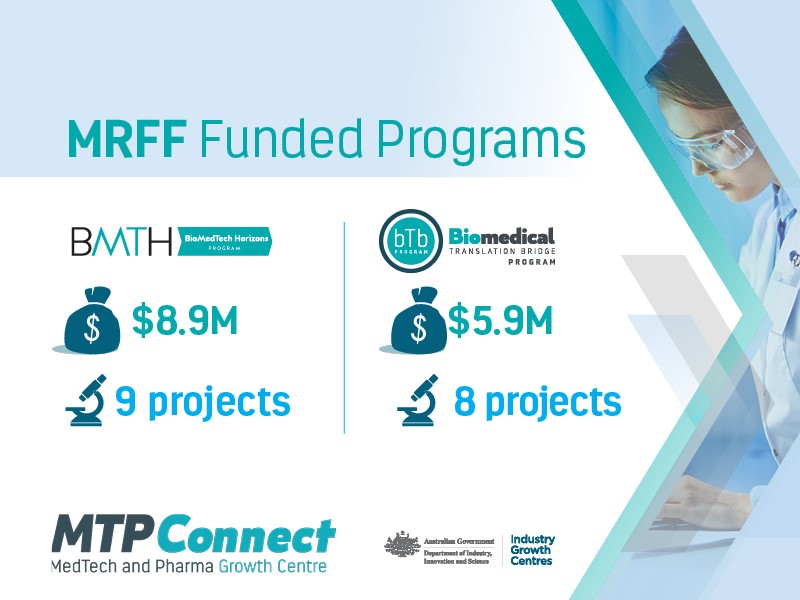13 December 2019
MTPConnect – the Australian Government’s Medical Technology, Biotechnology, and Pharmaceutical (MTP) Industry Growth Centre – and the Acting Minister for Health, the Hon Alan Tudge MP, today announced $14.8 million of funding for 17 early stage health research projects financed by two programs within the Australian Government’s Medical Research Future Fund.
The Government is investing $14.8 million in these projects through the Medical Research Future Fund (MRFF), comprising $8.9 million into nine projects through the BioMedTech Horizons (BMTH) program and $5.9 million into eight projects through the Biomedical Translation Bridge (BTB) program.
The programs will leverage a further $25 million in contributions from industry, further stimulating Australia’s health and medical research sector.
Patients of the future are set to benefit from new research into treatments for conditions such as Parkinson’s disease, heart disease, Irritable Bowel Syndrome, macular degeneration, lung diseases and infections related to Cystic Fibrosis.
Dr Dan Grant, Managing Director and CEO of MTPConnect, said the successful projects will cover new medical technologies and novel therapies to address unmet clinical needs.
“We believe these research projects could eventually play a vital role in tackling a number of major challenges for our health sector and contribute towards delivering improved health outcomes for Australians of all ages,” said Dr Grant.
Both the BioMedTech Horizons (BMTH) program and the Biomedical Translation Bridge (BTB) program aim to help Australia move more cutting-edge ideas and breakthrough discoveries swiftly towards proof-of-concept and commercialisation, while stimulating collaboration between the research, industry and technology sectors to maximise entrepreneurship and idea potential.
Dr Grant explained that the delivery of both programs is providing the necessary financial support and mentoring support to boost investment, commercialisation and success of early-stage health innovations developed in Australia.
“These new investments are filling a gap by backing the latest cutting-edge ideas to support ongoing health innovation in Australia – building home-grown translational and commercialisation capacity, which in turn boosts our knowledge economy and creates new products, jobs and potential exports.
“This significant investment in early Australian research is positioned to deliver real impact, not only to the health and wellbeing of Australians but potentially to people all over the world.
“Australian research has been responsible for some of the most significant medical developments of the past 100 years. Supporting viable, new health biological and medical technologies with funding to reach proof-of-concept, clinical trials and beyond, will advance our vibrant MTP sector, create new opportunities for advanced manufacturing in Australia, grow our economy and ultimately save lives.”
Both funding programs attracted an extremely strong response from the sector across Australia. The applications were reviewed in a competitive process by independent evaluation committees comprising of scientific, clinical and commercial experts. Further details about the successful projects are listed below.
BioMedTech Horizons:
- Cyban Pty Ltd, Victoria, is developing a novel brain pulse oximeter to monitor brain oxygen levels following traumatic brain injury
- Kunovus Technologies Pty Ltd, New South Wales, is developing an elastomeric motion-preserving implant to treat lumbar spine osteoarthritis as an alternative to fusion
- Macuject Pty Ltd, Victoria, is developing artificial intelligence-based clinical decision support software for intravitreal management of age-related macular degeneration
- Advanced Genetic Diagnostics Pty Ltd, Western Australia, is developing genetic tests to identify people at high risk of heart disease
- IntelliDesign Pty Ltd, Queensland, is developing portable bedside low field magnetic resonance imaging
- PolyActiva Pty Ltd, Victoria, is developing sustained release ocular implants for delivery of steroids and non-steroidal anti-inflammatory medications to the eye for the prevention and treatment of macular oedema
- IDE Group, New South Wales, is developing a control sleeve for intravitreal injection system
- WearOptimo, Queensland, is advancing cardiac microwearables for rapid, minimally-invasive personalised cardiovascular medicine
- Enlighten Imaging Pty Ltd, Victoria, is developing a novel hyperspectral retinal imaging platform for next generation artificial intelligence diagnostics.
Biomedical Translation Bridge:
- AdAlta Limited, Victoria, is developing clinical imaging of the cell surface receptor CXCR4 in idiopathic pulmonary fibrosis (IPF) patients. IPF is a progressive lung disease consisting of recurring inflammation and damage that causes the lung to stiffen, making it hard to breathe.
- Australian National University, Australian Capital Territory, is developing rapid and objective eye and brain testing for better management of ophthalmic and neurological diseases.
- DBS Technologies Pty Ltd, Victoria, is developing an innovative device providing adaptive deep brain stimulation for people with Parkinson’s disease
- MecRx Pty Ltd, Victoria, is developing novel, small molecule therapeutics for the treatment of lung cancer
- Noisy Guts Pty Ltd, Western Australia, has developed a non-invasive acoustic belt that uses artificial intelligence to decode gut noises to accurately diagnose and monitor common gut disorders such as Irritable Bowel Syndrome
- SpeeDx Pty Ltd, New South Wales, is seeking to commercialise its ResistancePlus® MABSC/MAC test, a rapid in vitro diagnostic tool to accurately and quickly identify bacterial infections related to Cystic Fibrosis, while using gene markers to predict antibiotic susceptibility or resistance.
- University of Melbourne’s Melbourne Dental School, Victoria, is progressing a novel dental implant to commercialisation
- Vast Bioscience, Queensland, is developing 3D small molecule sodium channel inhibitors for the treatment of postsurgical pain
Click here to read the full announcement.




